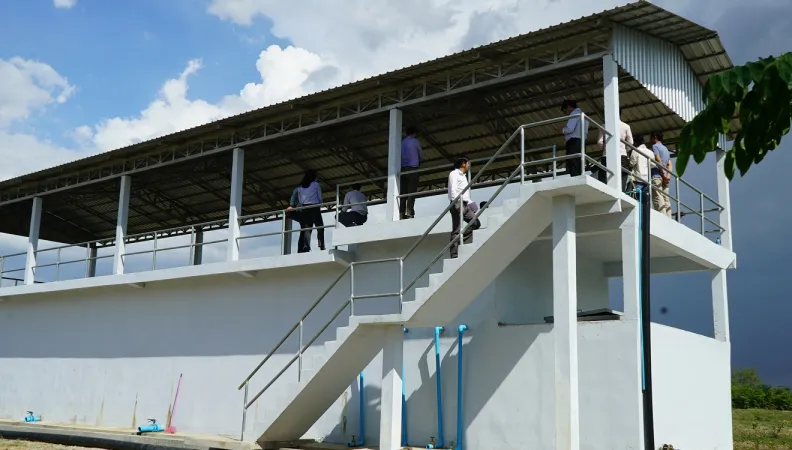Share the page
Broadening Access to Water in Rural Cambodia
Published on

Agence Française de Développement (AFD) and the European Union continue to support private water and electricity operators in Cambodia with the aim of broadening access for people to meet their basic needs. Pheaktra Thlang, water project officer at AFD’s office in Phnom Penh, tells us how this helps the government fulfill its objective of providing water for all by 2025.
What are the issues involved in access to water in rural areas in Cambodia?
Pheaktra Thlang: Rural areas in Cambodia still have very limited access to running water: only about 30% of the population has access. The other residents get their supply from water sources outside their homes, which may or may not be protected against external contamination.
While private operators provide the service, they are not always trained in how to develop projects in the water sector. And sometimes their practices are inefficient: cheap and non-durable materials with high rates of leakage; non-essential investments; and a lack of monitoring to name just a few problems.
For example, an operator installed a water treatment plant as part of a project to pump water from an aquifer. It then developed a second project replicating the first, where the latter served no new substantive need. The role of the NGO GRET, which has worked with water operators in Cambodia, is to avoid this type of action which is both inefficient and expensive, as operators’ bloat their billing to remain profitable.
It is often less profitable for investors to try to extend networks to rural areas, not least because the loan terms they can get from banks are not attractive. Banks prefer to support companies in urban areas.
How has the program supported by AFD addressed these issues?
The program’s objective was to contribute to increasing the number of people with access to a high-quality drinking water distribution service in periurban and rural areas, and thereby improve health and hygiene conditions for these people. Its specific feature was the major role assigned to private technical and financial stakeholders for the provision of this public service and the training activities organized for these stakeholders.
Private water operators received two types of support: a €15 million credit line allocated by AFD to the Cambodian Foreign Trade Bank (FTB), to facilitate their access to financing with low interest rates, and technical assistance from GRET financed by a €2.5 million European Union grant to ensure an efficient operation of the future infrastructure.
GRET’s role was to help them develop their business plan and act as an intermediary with the bank to vouch for the project’s coherence. When the project was approved, the operator hired a consulting firm to design and supervise the project, thereby confirming its sustainability. The operators were encouraged to invest in rural areas that were generally not covered. At the same time, a subsidy system was set up to promote access to water for the poorest households that couldn’t afford to pay for an individual connection.
Further reading: Vietnam: A New Mechanism to Improve the Resilience and Management of Natural Resources
FTB also benefited from technical assistance for the development of specific in-house expertise to support the development of a microenterprise/SME fabric operating in the water sector. This technical assistance aimed to improve the identification of projects and assess their feasibility and financial viability, train the bank’s managers, and help adapt the financial and non-financial criteria.
A total of 31 operators benefited from this program, which has improved access to water for 72,000 households, including 35,000 which did not have access before the project. The project has also had an impact on the efficiency of water networks. For example, we have managed to reduce the electricity consumption of an operator by 50% by improving the project design and rehabilitating facilities.
How will the next stage of the project be handled?
The next stage of the project will be handled by Proparco, AFD’s private sector arm. This second phase should take things further by trying to strengthen the local network of brokers and consulting firms. The objective is to help operators prepare loan applications and design infrastructure, as well as handle relations between the operators and banks.
As with the first phase, private electricity operators will also benefit from assistance. An external consultant is currently carrying out a market study to establish the market potential and refine the financial and technical components of the second phase.
For the longer term, the Government is looking at legislation to allow operators to get loans from banks on more favorable terms, by setting up a license system and acting as a guarantor so that they can have easier access to credit.
